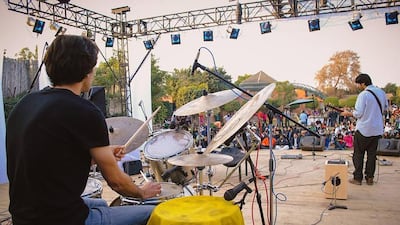“We would like to dedicate this performance to victims of terrorism everywhere, be they in Paris, Baghdad, Beirut – wherever.” Those were the first words from the vocalist for the band Red Blood Cat at auditions for the United States Embassy-backed Centrestage USA programme, in a university in Islamabad on Tuesday.
No sooner were they uttered when someone heckled from the crowd “what about Palestine?” and started shouting “long live Gaza”, ignoring the band’s request to honour the victims with a moment of silence.
The opening gesture had clearly backfired, but as I sat and thought about it, I wondered why the band had decided to offer it.
A week ago, in a home-built studio in the city’s suburbs, I had spoken to the some of these musicians about this very concert, which could land them a paid tour of the US – potentially a career-defining move for a small, unknown band from Pakistan.
Back then, they were distinctly uncomfortable with the idea that they would have to showcase not just their music but also somehow reflect Centrestage’s stated goal of helping music transcend cultural boundaries and differences.
“Yaar, I just feel that we should put a paratha and some daal in front of us before we begin and say, ‘Here – this is our culture!’” says Zain Ali (guitars/synths). Although he jokes, it also reflects the band’s major concern.
The Centrestage audition meant a rare chance for Red Blood Cat to stand out among the otherwise moribund Pakistani music industry, yet it was clear that their odds of landing the tour would improve considerably if they decided to “ethnicise” their music.
The challenge is not a musical one, as the band is not afraid of taking on local music. Two of the members, Zain and Danish Khawaja (guitars), recently collaborated with an iconic folk singer from the Thar Desert, Mai Dhai, and their songs have received tremendous acclaim across the country. But Red Blood Cat want to hold on to the style that they have created for themselves as they prepare to release their debut album later this month.
The band’s dilemma also represents the unique conditions which led to the evolution of their jazz-rock instrumental sound. The members – Ali; Hasham Cheema (vocals/synths); Varqa Faraid (keyboards); Khawaja; Ibrahim Akram (drums); and Parham Faraid (bass) – all grew up during the early 2000s when Pakistani music was enjoying its heyday.
There were several popular music channels on the newly-liberated TV networks and a plethora of new acts inspiring a young and rapidly urbanising population. Yet a combination of a weak industry infrastructure and the financial and security fallouts of a virtual civil war from terrorism, meant that by the end of the new millennium's first decade, the music scene was reduced to the popular annual TV show, Coke Studio, and little else.
Consequently, when the band members first met and began to play with one another over the past five years, they had no compulsion to develop a “commercially viable” sound. Almost all of them had found work as session musicians, allowing them to continue playing for a living.
However, that might have been a blessing in disguise too, as the fact that they never had to worry about appealing to music channels or radio audiences meant they could develop a unique sound.
Although they were known in the local Islamabadi scene for a while, they truly exploded onto the small but committed core of Pakistani indie music at a concert in Lahore last year. Music writer Farhad Mirza wrote the following on their set, which had left the crowd raving.
“The compositions, though sometimes odd and quirky to the point of paradoxical predictability, are infectiously exhilarating, operating on an emotional logic that challenges the linear thought process of conventional song writing. Red Blood Cat has managed to become a progressive rock band that refuses to be subtle, whilst remaining graceful.”
Yet despite engaging the critics at such a cerebral level, most concertgoers marvelled at how much fun the band seemed to have with each other, exuding a self-deprecating insouciance to go with their technical virtuosity.
When I ask the band about their seemingly contradictory ability to marry complicated music with unabashed fun, their responses belie a desire to follow instincts and intuition.
They explain that their sound has largely emerged out of a desire to simply impress one another. “It’s this thrill you feel trying to almost one-up one another, having a battle of sorts,” explains Akram.
Yet despite, or perhaps due to, the technical complexity of these, they are decidedly laidback in their approach to them.
The album is still without a name but most of its songs were performed at the Centrestage audition mentioned earlier, and by the time the set ended, the air in the auditorium was electric. Granted, many of the hecklers and curious bystanders left early on in the set, but as the band went from one song to next, they continued to revel in their eclectic mix of prog-rock, jazz accents and atypical melodies.
When We're Older, a previous single, is a tour de force of dreamlike melodies, complex time signatures and crescendos of sound interspersed with instrumental solos, where the band can go from intense passages to referencing the theme song from Inspector Gadget.
The album has no distinct themes but Akram says: “You can draw a line through each of the songs and see the connection.”
Sitting at the back, I couldn’t quite tell what the adjudicating committee made of their set (the band will find out if they won in the next few weeks), although everyone around me was rapt. Here were intensely talented musicians who had put together a near-flawless set of challenging, delightful and gimmick-free music.
Regardless of whether it leverages them to a sustainable future, they’ve already made a mark on Pakistan’s pop music history.
Ahmer Naqvi is an Islamabad- based journalist who writes on culture and sport.

